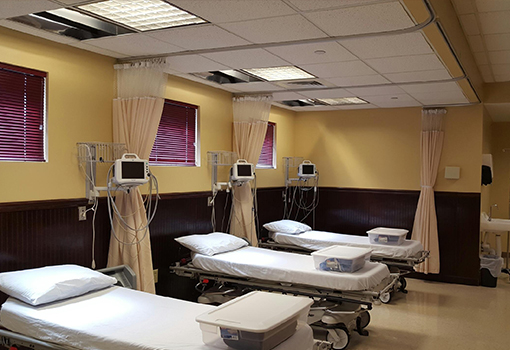Pancreatitis
Pancreatitis is inflammation of the pancreas. The pancreas lies behind the stomach and is the most powerful digestive organ in the body. It has a double function: 1) secreting insulin and glucagons for sugar metabolism; 2) producing enzymes or chemicals that enter into the small intestine for the digestion of food.
Diabetes is the most common form of pancreatic disease, and pancreatitis – inflammation of the pancreas – is probably the second most common disease of this organ. In pancreatitis, the digestive enzymes from the pancreas escape into the unprotected surrounding tissues, which they proceed to digest and destroy. This results in swelling or inflammation and increased amounts of blood in the pancreatic vessels.
Is it serious?
It can be very serious and sometimes fatal. Repeated attacks eventually will further damage the pancreas, and may result in the chronic or permanent form of the disease.
Is it a rare disease?
By no means. The precise figures aren’t known.
Is alcohol the only cause?
No, but it is by far the leading cause, especially of chronic pancreatitis. Gallstones, biliary tract disease and other conditions that obstruct the pancreatic duct through which enzymes pass into the small intestine can cause pancreatitis.
Other factors that are thought to contribute to the disease include nutritional deficiencies, prolonged use of certain drugs, such as diuretics and oral contraceptives, cigarette smoking and disturbances of fat metabolism. Hereditary pancreatitis can occur. In some cases, the cause is not determined. Some causes, other than alcohol consumption, can be corrected without much difficulty. For example, gallstones, the second leading cause of the disorder, can be removed in a routine operation and the patient will be cured.
Can children get it?
Yes. They will be afflicted by some of the less common types of acute pancreatitis such as those due to hereditary and metabolis abnormalities. Since alcoholism and gallstones are the principle cause of the disorder, most are middle-aged or elderly.
How does alcohol affect the pancreas?
Alcohol is a powerful stimulant of gastric acid, the hydrochloric acid secreted by the stomach to digest food. While the precise mechanism of the action is not known, it is suspected that the increased level of gastric acid, in turn, stimulates the pancreas to secrete excessive amounts of the enzymes that do the damage in pancreatitis. Alcohol may also directly injure the pancreatic tissue.

What are the symptoms of pancreatitis?
Attacks of acute pancreatitis are usually signaled by severe abdominal pain. Other symptoms include vomiting, constipation, fever, and jaundice. In very severe cases, the pancreas may hemorrhage, resulting in shock.
In the chronic form of the disease, abdominal pain may be constant. Despite normal appetite, weight loss is common, due to malabsorption of food resulting from destruction of the pancreas and the lack of pancreatic enzymes. If the pancreas has been extensively damaged, it may be unable to produce sufficient insulin and diabetes may develop.
How is it diagnosed?
The level of pancreatic enzymes in the blood quickly rises above normal a few hours after the onset of acute pancreatitis. Therefore, serum enzyme tests are widely used in diagnosis. To exclude the possibility that the condition may be perforated ulcer, appendicitis, intestinal obstruction, or some other abdominal emergency with similar symptoms, radiological (X-ray) examinations are often performed.
A history of previous attacks of acute pancreatitis is the best lead to the diagnosis of chronic pancreatitis. The presence of elevated serum enzyme and sugar levels in the blood will support the diagnosis. The chronic patient is often diabetic with impaired digestion, resulting in steatorrhea, that is, increased excretion of fat in the stools.
How is it treated?
For relief of pain, analgesic drugs and narcotics are usually prescribed. In milder cases, this may be the only treatment required. In severe cases, especially in those involving shock, blood transfusion and replacement of fluids may be necessary. In those relatively few cases that do not respond to treatment or where hemorrhage occurs, surgery may be indicated.
With prompt and proper treatment, patients with mild to moderate acute pancreatitis usually recover in several days. To prevent future attacks, they are place don a low-fat diet; small meals, which do not overstimulate the pancreas, are recommended. If alcohol is responsible for the pancreatitis, abstinence is strongly advised. If the condition is caused by some other factor, such as gallstones or a metabolic disturbance, this is corrected surgically or treated medically.
Similar treatment measures are administered to patients with chronic pancreatitis. Diabetes, steatorrhea and other complications can usually be controlled by medications. A variety of operations are available to relive the pain and halt the progress of the disease, but these are seldom successful and are justified only as a last resort when all else fails.
Most chronic patients respond to treatment. For them, the outlook is good – if they give up alcohol.
What are my chances of developing cancer of the pancreas?
There is evidence that pancreatitis, particularly if chronic, predisposes a person to a slightly increased risk of cancer of the pancreas.
What are my chances, with present treatment methods, of a complete cure?
Generally excellent…if you abstain from alcohol.

